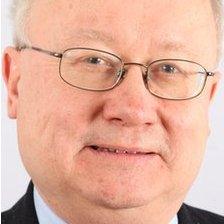GCSE backward step, says Welsh minister Leighton Andrews
- Published

Leighton Andrews wants an 'easily understood qualifications system
Wales' Education Minister Leighton Andrews says plans by the UK government to replace GCSEs with a single end-of-course exam are a "backwards step".
Westminster Education Secretary Michael Gove unveiled his plans for England, and invited Mr Andrews to embrace his proposed changes.
But the Welsh government will decide on their future in November after a review.
Mr Andrews said there was still a lot of support for GCSEs.
"It sounds to me as though it's a backwards step for England to be honest," he told BBC Radio 4's World At One.
"This doesn't sound like a 21st Century solution, it sounds like a solution developed in the latter half of the 20th Century.
"We are carrying out a full review of qualifications which we embarked on last year and we want a qualifications system that is understood by employers, prepares pupils for further learning and is easily understood by pupils and parents.
"GCSEs were introduced by a conservative government in the 1980s and are a very strong brand. I don't know what the outcome of our qualifications review will be.
"It might be that we keep GCSEs in Wales. I think there's been a lot of support for GCSEs."
Mr Andrews has previously said that whatever comes from the Welsh government's review, Wales will not return to O-level-style exams, like the ones in England.
Mr Gove announced a single end-of-course exam and one exam board for each subject.
He said the English Baccalaureate Certificate would modernise the system in England "so we can have truly rigorous exams, competitive with the best in the world, and making opportunity more equal for every child".
Mr Gove also challenged his Welsh counterpart to "embrace" his proposed changes to GCSEs, while claiming education performance had gone backwards in Wales.
He told MPs that his reforms to exams in England offered Mr Andrews an opportunity to show he would "operate in a constructive fashion".
"Every objective assessment of what's happened to education in Wales under Labour shows that education in England has improved more quickly and more effectively," he said.
The changes in England come amid controversy over this year's GCSE exams in English and whether they were too harshly graded.
Examiners in Wales have been regrading English papers taken under the WJEC examining board, after Mr Andrews ordered a review of results.
'Undermine confidence'
Mr Gove attacked that decision, saying it would "undermine confidence" in the value of the qualifications obtained by the students involved.
Mr Andrews said there were ways of addressing issues such as grade inflation and there had been quite a lot of misinformation being banded about.
He added: "The real question is do you want to rest your entire general qualification on a single examination?
Wales' education minister Leighton Andrews says plans by the UK government to replace GCSEs with a single end-of-course exam are a "backwards step".
"There are other ways of measuring skills. It's not simply about testing apparent accumulated knowledge through one three-hour exam.
"In Wales, we already have the Welsh Baccalaureate which young people take alongside A-levels, which gives them a much more general grounding and is well recognised by the CBI and other organisations here in Wales as providing the kind of broader based that they would like young people to have."
The WJEC exam board said it was extremely interested in developing "ambitious new EBC qualifications" proposed by Mr Gove but was also keen to "continue playing a leading role" in developing qualifications for Wales, following completion of the qualifications review.
Anna Brychan, of the National Association of Headteachers in Wales, says the issue is not about events in England.
The issues were what students learn, skills, and how to measure success.
Ms Brychan said it was not about comparing one model against another, and it was "entirely fair enough" if Wales wanted a different one.
"There will be some concern about departing from a model that we have known for a long time," she told BBC Radio Wales.
She added that every country in the world had a distinct education system and any system in Wales needed to be workable.
"We have to make sure that the qualifications are respected, that they give employers and further education institutions and higher education institutions the skills of the students they want," she said.
She said it was "perfectly feasible" for Wales to create a different system.
- Published17 September 2012
- Published17 September 2012
- Published17 September 2012
- Published16 September 2012
- Published16 September 2012
- Published22 June 2012
- Published15 September 2012